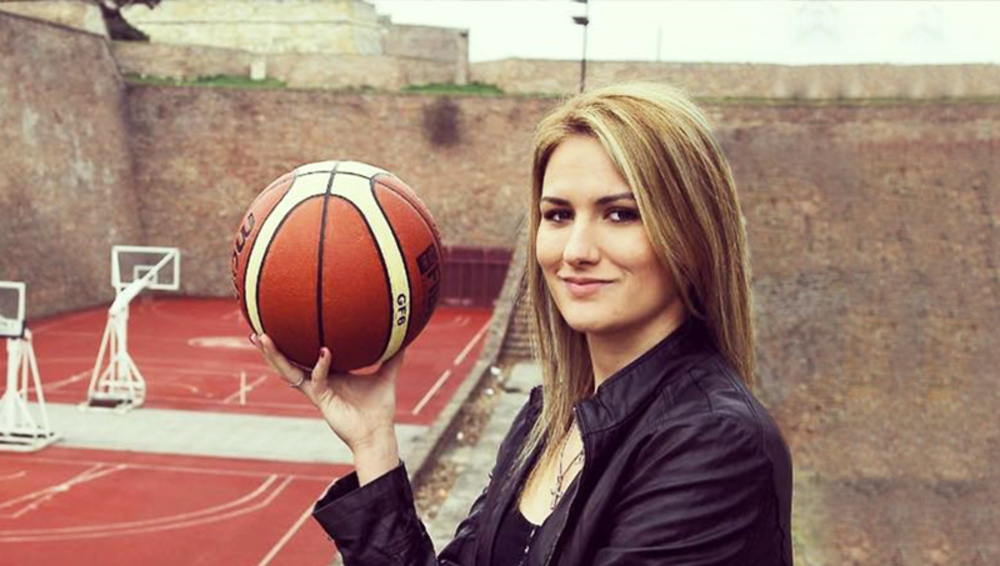It was supposed to be the first day of my grown-up life. My first time alone, playing basketball abroad. It became the first day of my new, second life, though…
It was September 7th, 2013. A few weeks ago, I had signed my first professional contract, in Hungary’s Uni Gyor. I was 19 years old and have never been so far from home, alone.
My father traveled with me for a month, to help me adjust. I still remember the enthusiasm I got for finally living by myself. Before his departure for Belgrade, he took a photo of me holding the keys to my new apartment.
Unfortunately, that joy didn’t last long. A couple of hours later our team bus left for the city of Sopron, for a preseason game. At the moment I couldn’t imagine that I would have to call my dad to tell him to come back, to visit me at a hospital… Now I think that I just hate to plan. I always have goals to achieve, but I don’t dream too far anymore. You never know how life will tun out and what it’s going to happen.
One time you just see your dream of playing basketball come true and the next moment you are in a hospital, missing one leg…
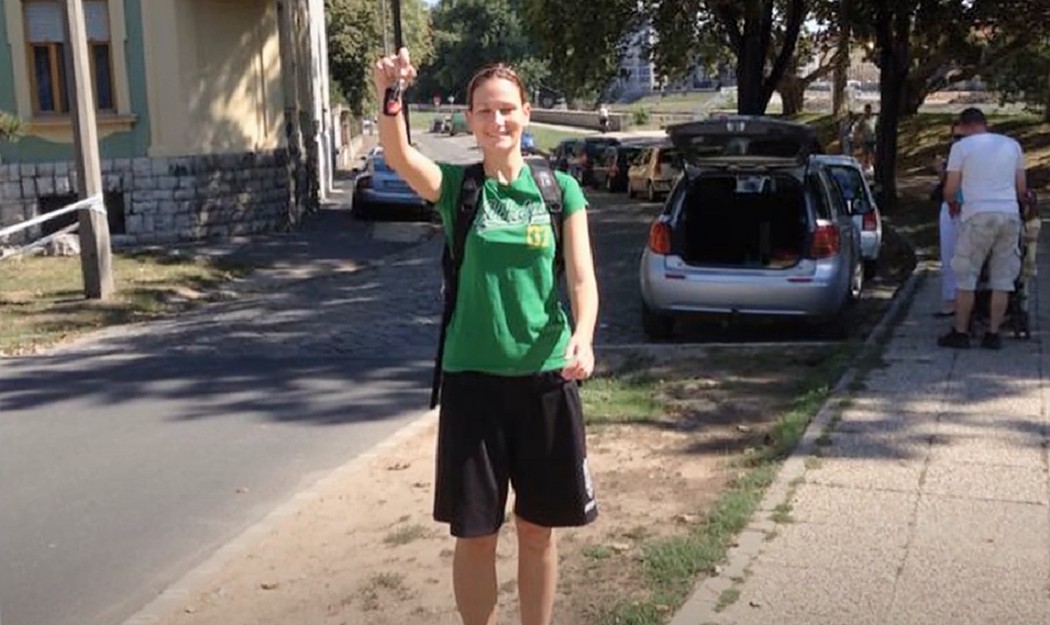
Natasa Kovacevic in Hungary, on September 7th, 2013 / Photo by: Screen shot from the documentary film “Skok – The Leap”.
It’s great to have plans, but I guess life shows you sometimes in a hard way that these plans should be short-term. It’s important to live in the moment.
I want to think what I can do something this day, in the best way I can, to improve my abilities. That’s my way of thinking after the September 7th, 2013 terrible car accident…
I survived but I had my left leg amputated at the knee. It was the beginning of a different life. It’s a journey that started in a horrible way but turned out to be amazing. It started terribly but I didn’t let it to define me as a person. It’s always easier to give up, to use it as an excuse and let things go. I am stubborn and from day one of the bus crash I couldn’t do it to myself. It would have been more hurtful.
I wanted to overcome that obstacle. I was happy I survived and now I am grateful I made it to the end. I was 19 but I wanted the wheel of my life to my hands.
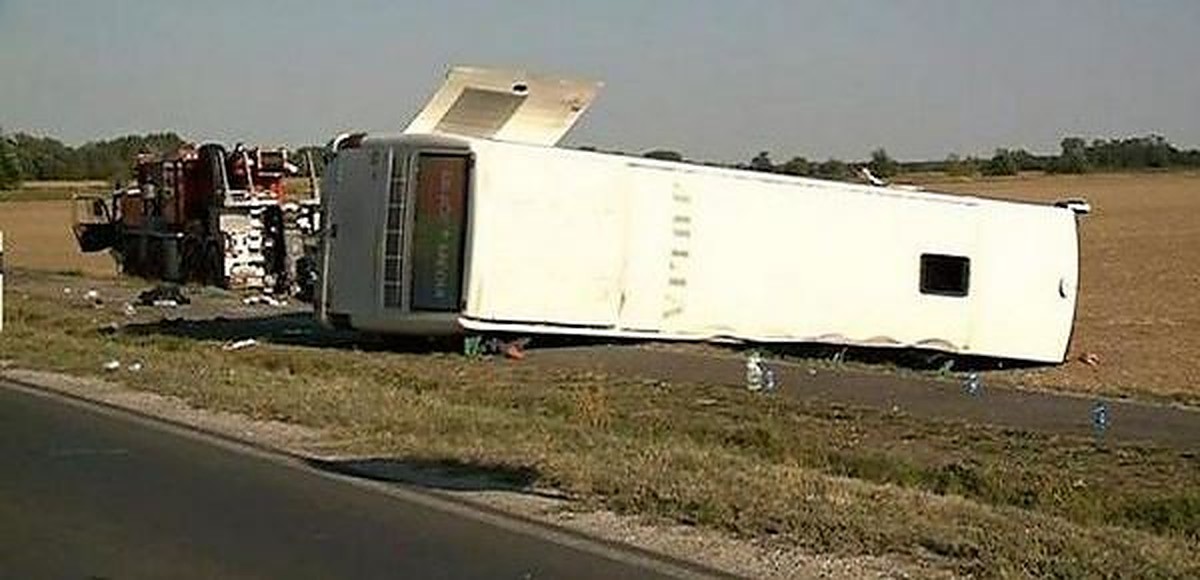
Uni Gyor’s team bus, after the accident on September 7th, 2013 / Photo by: baschet.ro.
I was sitting in the bus. I had my headphones on. I had Samantha MacKay, who now plays in Greece, sitting in the back seat and my countrymate Milica Ivanovic beside me.
I suddenly felt that the bus is going from left to right in high speed. I thought that something is about to happen and I took my headphones off and tried to watch.
It’s a moment like a flash, but you feel everything is moving in super slow motion… In a second, the bus ended up on its right side. I never had a car crash before and I was wondering if it’s a bad dream.
Samantha went out of the window before the bus landed in the ditch, by the road. When the vehicle stopped, me and Milica tried to crawl out.
When we did it, I remember myself standing. It all happened very fast. Then I saw my foot missing… To this day, I still can’t explain how I stood up, but I did. I guess it was about adrenaline.
I was completely conscious the whole time. We waited for the ambulance for more than an hour and at the end medical help came with a helicopter, because we were in the middle of the two towns.
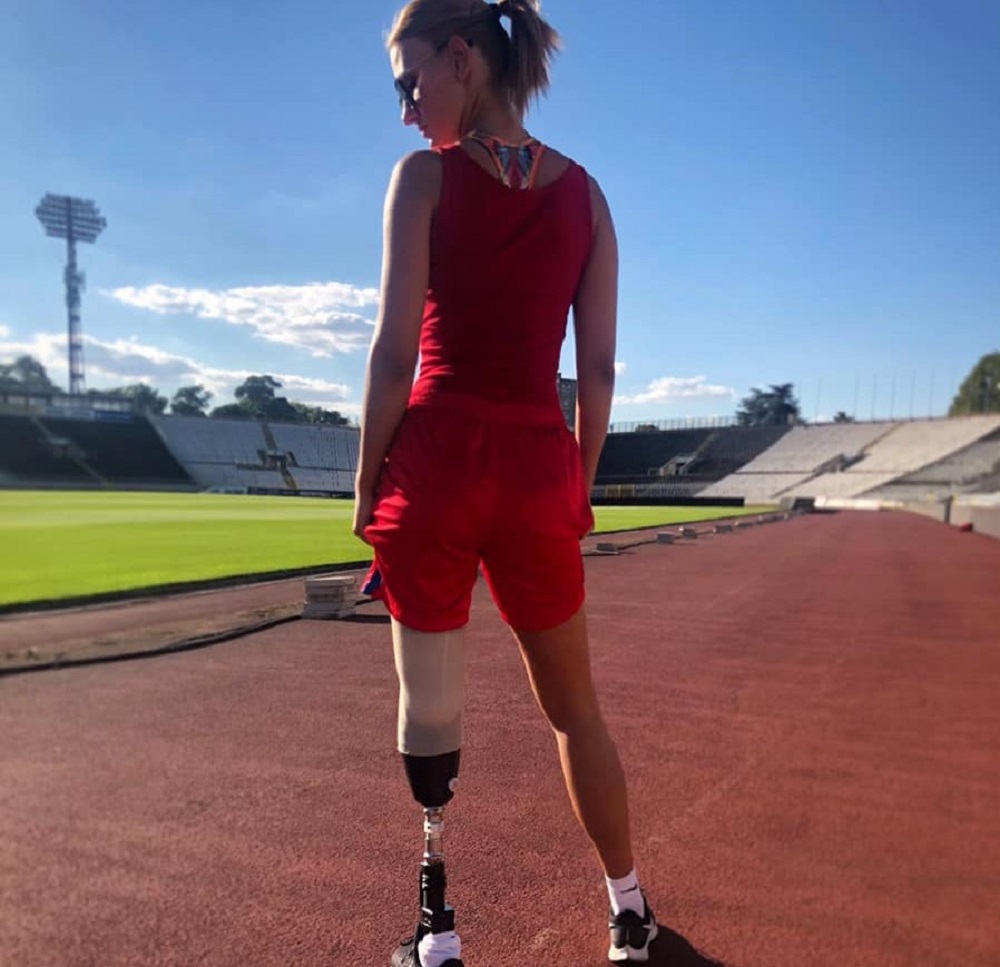
Wearing her prosthetic leg / Photo by: Natasa Kovacevic – Facebook.
I was aware of everything that had happened. Milica was with me. We used to spend time together, along with Samantha MacKay.
It was a hot day. Milica brought me water, she found my cell phone and handed over to me. I was the one who wanted to call my dad.
I was going to ask him to come back to Hungary. I didn’t want to tell him the whole truth, because he was in his car and perhaps hearing the real story would make him drive back like a maniac. I just told him that we had an accident and I broke my leg.
It was pretty chaotic. The girls were screaming. There were blood, smoke and some of the players, like Sam, fell off the window of the bus.
The tragic of that day wasn’t the fact that I lost my leg. People lost their lives… That’s because I still say that if the situation was hard for me, what the families of coach Akos Fuzy and general manager Peter Tapodi can say?
I had my head on my shoulders, I was still alive and I could control my life.
I actually saw my coach under the bus, in the small canal the vehicle ended up. It was a terrible, scary scene.
Obviously, I guessed that he was dead because he wasn’t moving… Later, in the hospital, I learned that Peter Tapodi also lost his life at the scene.
My physical pain was nothing compared to the mental one, hearing about these two losses. I was in the team for just a few weeks, but those people meant a lot to me.
It was really difficult to acknowledge the fact that they were gone…
Being in the hospital gave me, inevitably, a lot of time to think. I don’t think during the accident that, as they say, my life, my career, my dreams and my memories flashed before my eyes. The first thing that popped in my mind was that I will never be able to play again the sport that I love. It was hard from the beginning.
After my first night at the hospital, when I woke up, the first thing I thought was how my parents were doing. They were the ones that suffered more than me and I mean it.
It was harder for them because my situation was still in my power. I was facing that challenge and the only, important of course, thing they could do was watch and support.
I remember my dad always stand next to me, which meant a lot. I wanted, from my side, to help my family to handle the news and the fact that I lost my leg.
I come from a sports family. My dad practiced handball, my mother was a famous basketball player for Red Star Belgrade and the Yugoslavian national team and she won the European Cup, the today’s Euroleague in 1979. I also have an older brother who is practicing basketball too.
I wanted to show them that it’s not a big deal! I was talking to my brother, who is a bit crazy as me, and kept telling him to take care of our mother in Belgrade and I will take care of dad in Hungary.
We used some black humor, trying to turn the situation not exactly to something positive, but to a thing that we can all overcome. Something we need to face and get by together.
We are always a team. We used to play basketball in two-on-two games. We were always close, but that accident grew us stronger and the support was mutual.
There are no silly arguments in our house afterwards. I fight with my brother less and less and we learned to appreciate the time together and with ourselves and life in general.
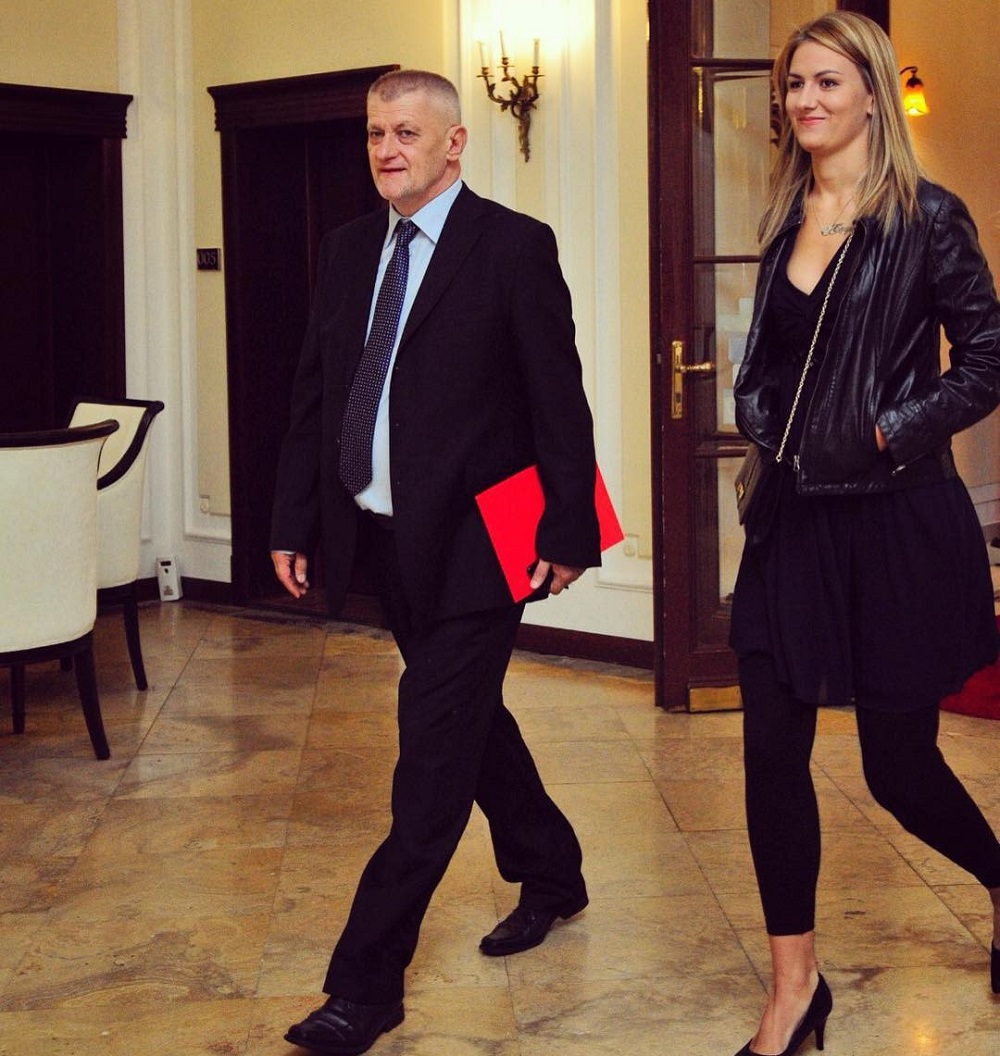
Natasa Kovacevic with her father, Vukasin / Photo by: Natasa Kovacevic – Instagran.
Now I don’t get too nervous or stressed about things. I don’t see problems in my life the way I used to. I just see them as challenges.
In life-changing situations, you learn to appreciate and enjoy the little details. Before the car crash, I took many things for granted.
Now I cherish every moment, like drinking just a coffee with my friends. The joy is these little things. Of course, we all have our dreams, our professional careers in which we put our focus on, but we are chasing our goals in such a hurry.
We forget to stay in the moment. Sometimes we have to take a step back, breath and enjoy the ride. My priorities did change. I stopped defining myself as a player. But basketball brought me some sort of education. I had my principles from home, from my parents, but I got some more from the game.
Sometimes I think that basketball prepared me for what happened. Through playing you learn a lot of great lessons, like to fight until the end, to never accept that the game is over until the last minute.

Sitting with (right) the Atlanta Hawks’ guard/forward, Bogdan Bogdanovic, in a Serbian Basketball Federation event / Photo by: Natasa Kovacevic – Facebook.
That experience made me stronger and after the accident helped me to overcome it. Even if you are not the best player, the form of education in sports is valuable and at the time you don’t understand those lessons.
It’s only afterwards that you see your state of mind is built like that, from these lessons.
In the hospital and during the two-month rehabilitation I looked inside me and tried to find my new identity. It was challenging. It was interesting because I am a person who likes to try new things.
I want to see what works for me. I worked as a journalist, I finished my master’s degree in Northumbria University in Newcastle, worked in Red Star and in FIBA and now I am in the Serbian federation. It was difficult to find that new identity, but it was also liberating. I tried things that I wouldn’t have tried if I stayed in basketball as a professional player.
I have a friend that stopped playing a few months ago and started working. It’s not easy to get outside of our “world”. Former athletes often feel lost. Sports is all they had, all they did for such a long period of life.
Stepping into the “normal” world is difficult. I had to experience that in young age and it was good for me. In every bad or even terrible moment and situation there is always something good and that’s not just easy words.

Natasa Kovacevic with (from up left, clockwise) former players Dejan Bodiroga (1), Dejan Tomasevic and Jorge Garbajosa (2), Tony Parker and Boris Diaw (3) and Vlade Divac (4) / Photos by: Natasa Kovacevic personal files.
Going through my personal challenge, I had such a great support from family, friends and encouraging messages from fans. That energy was the wind in my back that pushed me and helped me move on and give back.
The Natasa Kovacevic Foundation we created in 2014 was an opportunity to give some of that energy back and help. A few months ago, we started a campaign to “Let all the kids jump”. It’s an inspiration from the documentary for my basketball comeback, titled “The Leap”, which premiered in a symbolic date, on September 7th, 2021.
We try to find money to buy active prosthetics for kids under the age of 15, so they can live a normal life. This is my new life goal.
I am totally aware of the fact maybe we can’t help all the kids, but we try to provide them with the opportunity to live their lives to the fullest and be able to play sports.
Luck plays a big part in life, like it does in sports. But if we share and have the willingness to help and give back with pure heart, we can “create” luck and maximize our effort and assistance.
Your life is in your hands. I also never had any discomfort from the accident. I had no fears of getting in a bus or driving. I love to drive.
A few months after the crash I went skydiving! I know that some of my then-teammates had these fears and difficulties, but it wasn’t an issue for me. I started trusted myself and the “magic leg”, as I call my prosthetic leg. In 2015 I got back on the court to play for Red Star and we won the 2016 Serbian Cup!
In the first practice, individually, I saw that I can run, jump and I felt comfortable in it. Then I joined the team and practicing was easy.
But choosing to start the season was difficult, because I knew that I wasn’t going to be the same basketball player as I used to. I didn’t want to ruin that basketball image of mine.
The other part of my mind told me “try it! Let’s see how it will be”. Don’t be with the idea, the question in 20 years “what would it be?”. I decide to go for it and give my best.
Mr. “Bata” Djordjevic, a former coach and the father of Fenerbahce’s head coach, Sasha Djordjevic, came to visit in the hospital and brought me a small hoop and a basketball, to shoot, because I was going to stay there for two months.
He told me that with that state of mind I would come back. I will never forget his words and at the time I thought he was crazy.
I played passionately. I enjoyed the game but I wanted to be the best I can be and help my team to win. In the first game I think my teammates were more nervous than me!
It was like coming back home. My stubbornness won! I didn’t choose the time to end my career, but I got a chance to do it my way. That Serbian Cup medal is still my favorite and the proof to myself that I still can do it. I said goodbye to basketball in my own terms.
The journey was challenging and wonderful. It was a whole new way of thinking and approaching the game. I was aware that I wouldn’t be able to do everything I wanted.
I needed to adopt. I knew I would be a little bit slower, but at the same time it was fulfilling for me.
After that, working outside the game itself was a new world. A totally different view of it. As a player you care about the game and you don’t get to see the amount of work people need to do to make one match happen.
It was great that I saw basketball in whole other lights. The game I felt in love for, watching Peja Stojakovic and the Serbian team winning the World Championship of 2002, in Indianapolis.

Photo by: Natasa Kovacevic / Facebook.
The psychiatrists that met with me in Hungary told my father that there were some breaking points which I might face during my recovery. One of these points was attending a basketball game. I wasn’t one of the people that after a career-ending accident didn’t want to touch a ball or go to a match.
I never had any difficulties with it. I went to support my former teammates without the prosthetic leg. But working around basketball is a different thing than playing.
And it’s still more difficult to just watch this beautiful game even as a club member. You still want to play, although I accepted the fact that I am not a player anymore.
I face every challenge, I loved my “leap” and, at the same time, I am still my old self and a whole new person!

Photo by: Natasa Kovacevic / Facebook.
Editor: George Adamopoulos
CHECK IT OUT:
AthleteStories GLOBAL
Samantha MacKay: “Life Rebound” / Nesrin Akyüz Aydin: “Giving Up Is Not An Option”
Dani Spiliotis: “Against All Odds” / Kenneth Barlow: “Follow your symbolisms”
Batouly Camara: “Opportunities change the world” / Santia Deck: “Fight for the impossible!”

